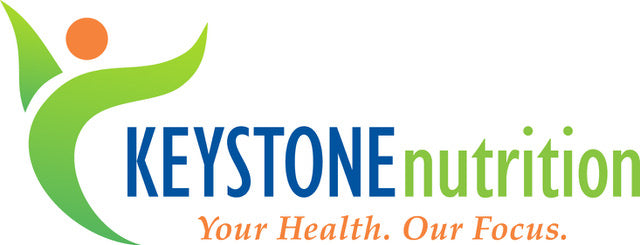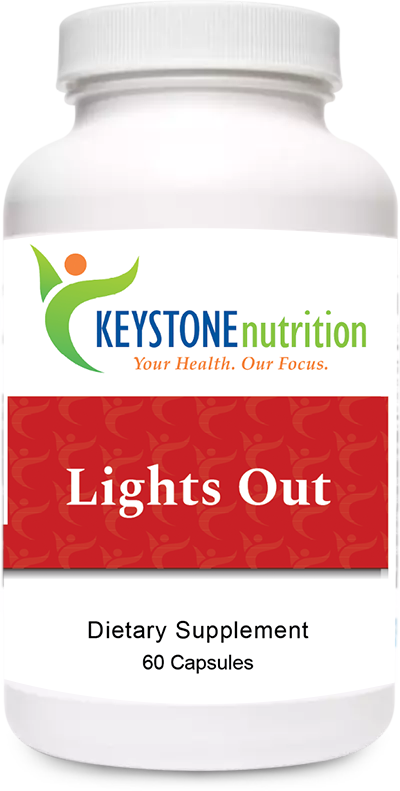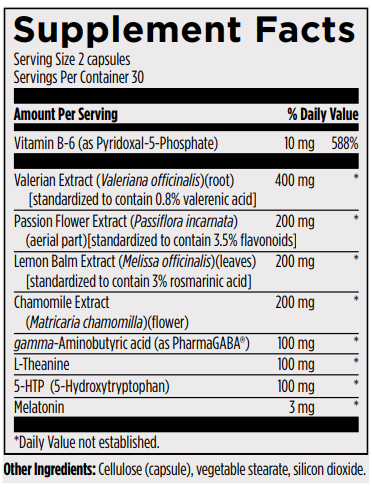KeystonePharmacyGR
Lights Out
Lights Out
Couldn't load pickup availability
Lights Out is a blend of botanicals, nutrients, and neurotransmitter precursors designed to support quality, restful sleep. By providing nutritional support for calm brain activity, Lights Out helps promote the body’s natural ability to fall asleep and stay asleep.* Key ingredients include botanicals that support nervous system function, PharmaGABA® (a proprietary form of gamma-aminobutyric acid [GABA]), L-theanine, melatonin, 5-hydroxytryptophan (5-HTP), and pyridoxal-5-phosphate (the activated form of vitamin B6).*
Recommended Use: Take 2 capsules per day 30 to 60 minutes before bedtime or as directed by your health-care practitioner.
Ingredient Highlights
Melatonin is a multifunctional neuroendocrine hormone whose main role lies in its involvement in the control of the circadian biological rhythms. Melatonin mediates the body’s response to variations of natural light availability from indoor/outdoor exposure or to the change of seasons (winter to summer). The visual perception of darkness tells the brain to make melatonin so the body can prepare for sleep mode. The production of melatonin normally peaks at night and is instrumental for maintaining quality sleep patterns.1,2 Melatonin production declines significantly with age, often causing sleep difficulties associated with aging.3‑6 Evidence from meta‑analyses and systematic reviews suggests that melatonin (dosages ranging between 2 g and 10 g) has positive effects on sleep quality by reducing sleep onset latency and increasing total sleep time in individuals with primary and secondary sleep disorders.7‑9 Exogenous melatonin has also been shown to promote improved sleep quality for postmenopausal women with sleep disturbances. Results from a systematic review and network meta‑analysis suggest that melatonin supplementation in the range of 0.5 mg to 12 mg (alone or in combination with other complementary and alternative therapies) promoted the amelioration of sleep onset latency and daytime sleepiness in both adults and pediatric populations with insomnia.
5‑HTP works in conjunction with melatonin, as a precursor to the serotonin biosynthesis, which can further support endogenous melatonin production during the night to help facilitate staying asleep. In the brain, serotonin is involved in mood modulation, cognition, learning, memory, reward, appetite, sleep, and more.12 Insufficient serotonin can contribute to impaired or reduced melatonin synthesis and cause insomnia. Therefore, 5‑HTP supplementation may help promote a balanced sleep/wake cycle by supporting serotonin synthesis.
Vitamin B6 (as Pyridoxal‑5‑Phosphate [P5P]) acts as a coenzyme in the synthesis of neurotransmitters including serotonin. The conversion of tryptophan into 5‑HTP and of 5‑HTP into serotonin requires P5P, which is derived from vitamin B6. P5P also acts a coenzyme in the synthesis of dopamine, norepinephrine, and GABA.14 Having adequate levels of vitamin B6 supports serotonin synthesis and melatonin production, as it is a precursor.*
Gamma‑aminobutyric acid (as PharmaGABA®) is a naturally occurring amino acid in the brain and a major inhibitory neurotransmitter in the central nervous system. GABA serves as a critical calming agent for the body, helping to support mild or occasional stress and anxiety.* The GABA in PharmaGABA® is made through the fermentation of the amino acid glutamic acid (glutamate) by the beneficial bacteria Lactobacillus hilgardii. As an inhibitory neurotransmitter, GABA inhibits nerve impulses, slowing down the activity of nerve cells and preventing them from overfiring. Upon binding with the GABA receptors, a negative change in the transmembrane potential occurs, which leads to hyperpolarization and a decrease in the excitability of neurons. . In stressful situations, GABA levels in the body can decrease, leading to an imbalance in the excitatory/inhibitory system. In a study on humans, prefrontal brain GABA levels decreased by 18% after acute psychological stress.15 Studies have shown that low GABA levels have been associated with poor sleep quality, especially in patients with post‑traumatic stress disorder.16 GABA can be calming, which may help to benefit mood, sleep, and the response to stress. In a study of 13 subjects, alpha and beta brain waves were evaluated by electroencephalogram after oral intake of GABA. Alpha waves are produced during meditation and any time the body is relaxed and alert. Beta waves, on the other hand, are seen in situations of high stress where focus and concentration are difficult. Results after 1 hour showed that GABA increased the production of alpha waves while decreasing beta waves, indicating that GABA may help induce relaxation and reduce anxiety.17 A systematic review found promising evidence for potential benefits of oral GABA consumption on stress and sleep, especially on inducing and improving early stages of sleep.
L‑Theanine is a nonprotein amino acid found in green tea with anxiolytic and stress‑reducing effects that have been shown to promote relaxation and support sleep.* The structure of L‑theanine is analogous to glutamate, so it has the potential to bind to glutamate receptors and hinder glutamatergic activation and associated neuroexcitatory effects, thereby supporting a healthy response to stress.*19‑23 It may also decrease glutamate release in the pre‑synaptic terminals since glutamatergic transmission is affected by L‑theanine–mediated inhibition of glutamine uptake to suppress the conversion of glutamine to glutamate.20‑23 Research illustrates that L‑theanine may increase alpha wave transmission, which is more predominant in restful and relaxation situations. L‑theanine may also promote the release of GABA, which regulates serotonin and dopamine levels.20‑22,24 Studies have found that L‑theanine also lowers cortisol production. 20‑22,24 Clinical studies found that supplementing with L‑theanine is beneficial to support the treatment of occasional stress, anxiety, and depression, and to enhance sleep quality and cognitive function.20,21,24‑27
Calming Herbal Blend Each 2‑capsule serving of Insomnitol™ contains 400 mg of valerian root (Valeriana officinalis) standardized to contain 0.8% valerenic acid, 200 mg of passion flower (Passiflora incarnata) standardized to contain 3.5% flavonoids, 200 mg of lemon balm (Melissa officinalis) standardized to have 3% rosmarinic acid, and 200 mg chamomile (Matricaria chamomilla). All of these ingredients are considered nervine botanicals that have been traditionally used as a sleep aid due to their relaxant properties and ability to help promote quality sleep, without causing morning drowsiness.28 The sedative and sleep‑promoting properties of valerian, passion flower, and lemon balm may be influenced by the interaction of the volatile oils and bioactive constituents with GABA receptors, modulating GABAergic signaling.29 Although research on valerian root is inconsistent and more clinical studies are needed, a systematic review and meta‑analysis of 60 studies suggest that it may be an effective herb to help promote sleep.30 In vitro and clinical studies showed that valerian root may help reduce sleep latency and improved subjective sleep measures.29 In vitro and animal models found that passion flower reduced sleep latency and increased sleep duration, and lemon balm improved overall sleep quality by decreasing GABA transaminase activity, which metabolizes GABA.29 In a clinical trial (n = 60) of elderly people, the group receiving 200 mg of chamomile extract twice daily for 28 days showed significantly improved sleep quality compared to the control group.31
* These statements have not been evaluated by the Food and Drug Administration. This product is not intended to diagnose, treat, cure, or prevent any disease.
Share
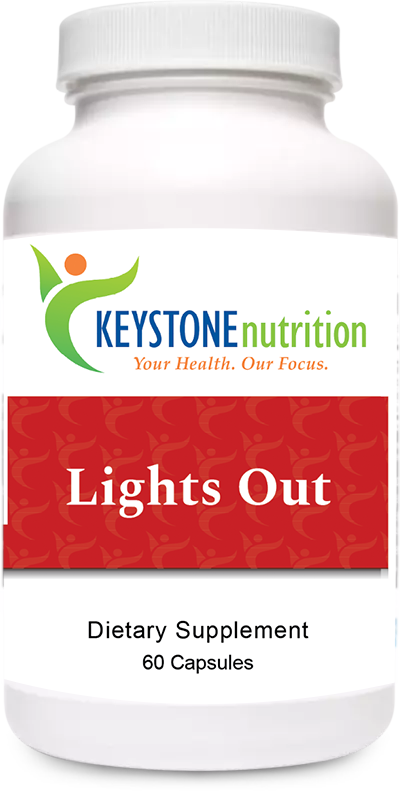
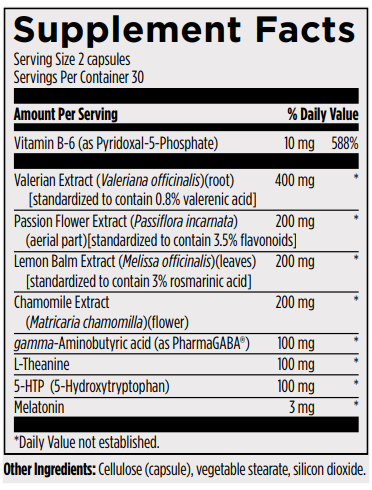
Subscribe to our emails
Be the first to know about new collections and exclusive offers.
